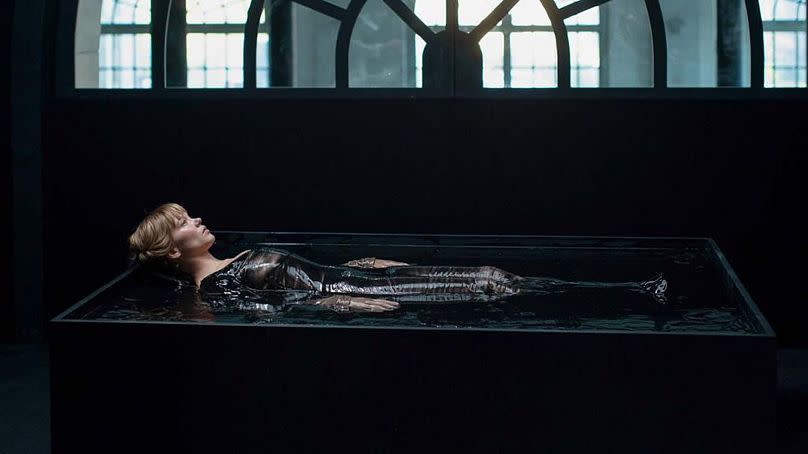Euronews Culture's Film of the Week: 'La Bête' ('The Beast')- Bertrand Bonello's sci-fi masterstroke

In a near future where artificial intelligence reigns, human emotions have become a threat. AI sees feelings of pain, including a broken heart, as limiting the potential of humans. It can erase them. However, getting rid of them means reexperiencing your memories.
Gabrielle (Léa Seydoux) decides to purify her DNA by going back into her past lives. There, she reunites with Louis (George MacKay), and through the centuries, both of them keep connecting, as if cosmically drawn to one another.
We follow the couple over three time periods (1910’s Belle époque, 2014 and 2044) in an odyssey that spans two continents and so many genres.
A chance encounter at a Parisian society party sees Louis remind Gabrielle that she once confessed she would never be involved in a relationship because of a terrible premonition: the eponymous beast which would “obliterate” and “annihilate” her and anyone she loves.
In 2014 Los Angeles, Gabrielle is an aspiring actress, while Louis is an Elliot Rodger-inspired incel on the verge of violence, and who begins to stalk her.
The future sees Gabrielle at an AI purification center, where she meets him again, as he is about to undergo the same process.

Sounds like a lot?
Well, strap in, because this genre-bending tale from French conceptualist Bertrand Bonello (Nocturama, Zombi Child) is a lot to take in. Loosely inspired by Henry James’s 1903 novella “The Beast in the Jungle”, it’s a formally daring sci-fi melodrama that feels like a heady cross between Eternal Sunshine of the Spotless Mind and Cloud Atlas, which often cribs from Stanley Kubrick and David Lynch, to make a pulsating epic with unique staying power.
It can seem unwieldy, but central to The Beast ’s potency is the way the director doesn’t get overwhelmed by his out-there concept and manages to defy tones, and create coherence out of confusion. The feeling of a disjointed narrative gradually dissipates, helped along the way by Bonello’s masterful balancing act that sees him calibrate the intimate and the spectacular, as well as intertwine classicism with modernity.
Within each period, he orchestrates some frequently chilling recurring symbolism and echoes (pigeons, dolls, knives, Madame Butterfly), as well as some exhilarating set pieces. The opening sequence featuring Seydoux’s character acting out a horrific scene surrounded by a green screen is haunting, while the 1910 period stands out with a scene set in the flooded basement of a doll factory.

Speaking of Seydoux, this is arguably the best she's ever been. It’s through her character that the discomforting atmosphere is cranked up one notch at a time, as every minute of her performance reminds you that Gabrielle internally wrestles with the possibility of rejecting risk and embracing catastrophe instead. It’s electric to witness.
Ultimately, The Beast is one of those “you have to experience it to get it” films, and to go any further into the film’s twists would do this sophisticated melodrama a great disservice.
Safe to say though that its layered musings on human connection, the fear of loss and how the completion of desire may lead to the destruction of passion, also tap into the modern malaise regarding AI’s self-governance.
As mentioned earlier, it’s a lot to take in. But you won’t mull over a film quite like this one or as intensely all year.
La Bête (The Beast) has been released in various European territories already, and is out now in the UK and Ireland.
